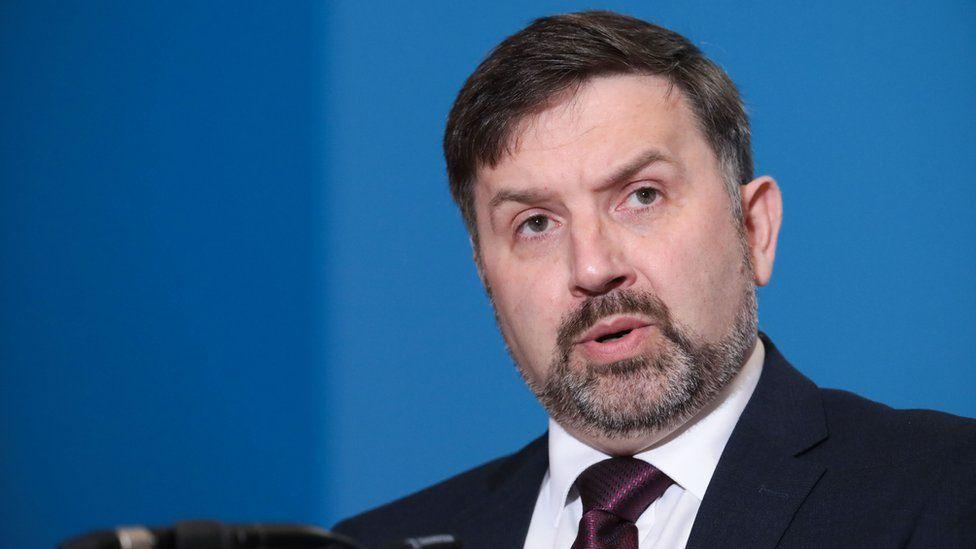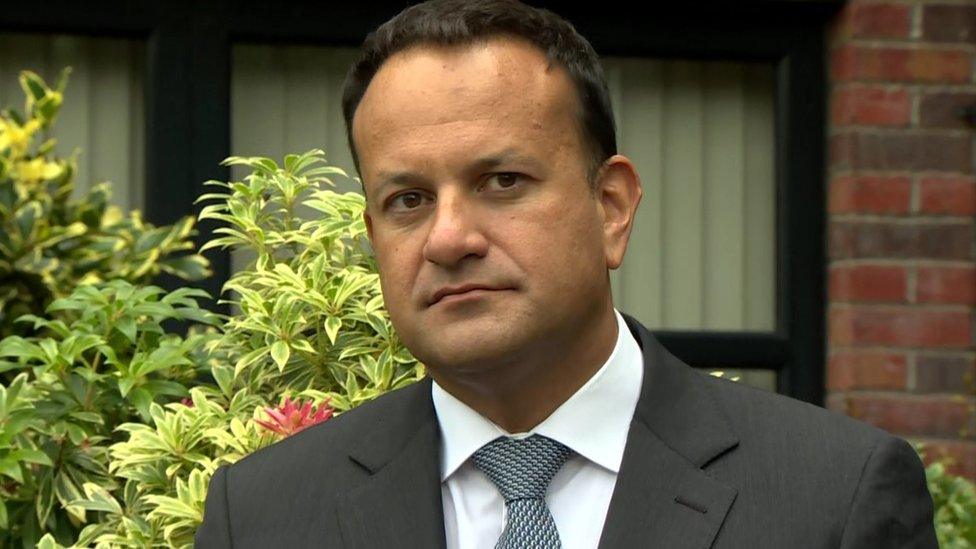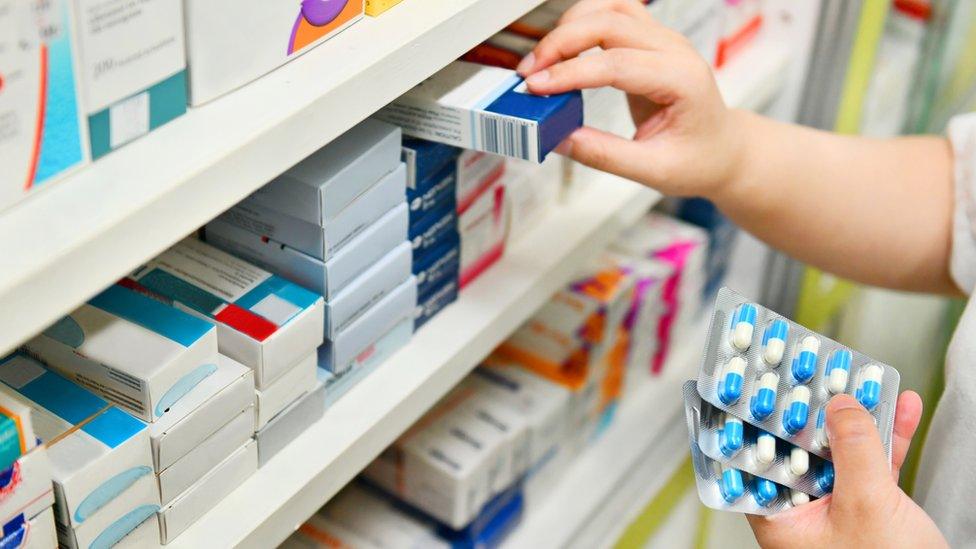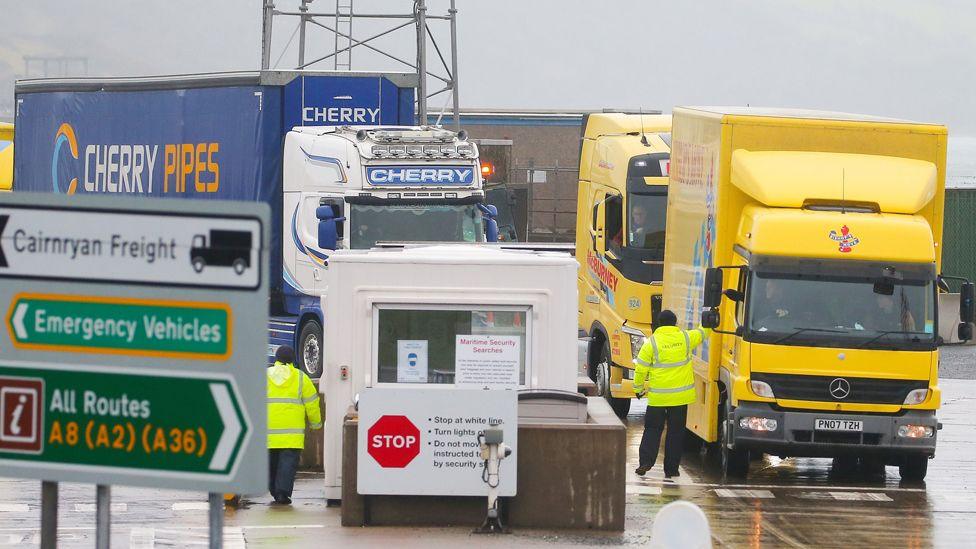'Patients at risk' if medicines withdrawn due to NI Protocol
- Published
- comments

Northern Ireland gets most of its medicines from GB distributors
The health minister has warned of a risk to patients if pharmaceutical firms go ahead with plans to withdraw medicines due to the Northern Ireland Protocol.
NI gets most of its medicines from distributors in Great Britain, but is still covered by EU medicines rules.
That will make exporting medicines from GB to NI more difficult in January when a Protocol "grace period" ends.
The health department has been notified 910 medicines are due to be withdrawn.
There is no immediate risk to supplies and the health department has previously said people don't need to change their prescribing behaviour.
Medicines suppliers must give six months notice when they intend to withdraw a product.
In a briefing paper, which has been circulated among ministers and senior officials in recent days, Stormont's Health Minister Robin Swann said he now had "deep concerns about the risk to patient health and maintaining vital medical supplies".
He is calling for a "standstill" which would mean an extension of the grace period.
The paper said the planned withdrawals "cover all classifications of medicines, including prescription-only medicines, pharmacy and general sales list medicines".
Almost 90% of the confirmed withdrawals are classified as high risk, meaning there is the potential for disruption and the need for some form of mitigation.
That mitigation could mean using alternative products or seeking alternative sources of supply.

Mr Swann supports a UK government proposal to remove medicines from the Protocol
The major issues are the need for additional batch testing for medicines moving from GB to NI and continued compliance with the EU's falsified medicines directive.
Earlier this year the British Generic Manufacturers Association (BGMA) said these issues would make it commercially unviable to sell some products in Northern Ireland.
The EU has proposed measures to ease the problem but the UK government is sceptical about whether they are enough.

Instead the UK has proposed that medicines should be completely removed from the scope of the Protocol with an extension of the grace period until that can be agreed.
But the two sides have not yet agreed on a way forward.
Mr Swann supports the UK government proposal to remove medicines from the Protocol but it is not clear if other Northern Ireland Executive parties share that view.
Stormont health committee chairman Colm Gildernew said there were issues of "huge concern" that required a "focused piece of work".
When asked on BBC Radio Ulster's Good Morning Ulster programme if he supported Mr Swann's position that the best solution was to remove medicines from the scope of the protocol, Mr Gildernew said he was not clear on the potential impact of a joint position by the Executive but would meet with the minister to discuss the issue.
He said he believed the issue was "too important for unilateral action" and said he wanted "dedicated and urgent bilateral negotiations building on the good will that exists".
The Sinn Féin MLA said no one wanted to see medicines interrupted and that he understood the concerns and the uncertainty around it.
"I think this needs to be negotiated in good faith with the European Union. I believe all solutions need to be kept on the table but it is absolutely crucial that good will is maintained," he said.
Wake-up call
Ulster Unionist leader Doug Beattie said the warning from Robin Swann should be a "wake-up call" for the EU and the UK government.
"This isn't scaremongering - it is the practical out-workings of the NI Protocol and there is a practical solution," he said.
"There is no immediate shortage of medicines, but if action isn't taken now that is exactly what we could be facing come the new year."
The DUP MLA Jonathan Buckley called the situation a "fiasco" and said it was "immoral, unjustifiable and cannot be tolerated."
He added: "The imposition of the protocol impacts and harms every single person in Northern Ireland. It should be opposed by everyone."
Community pharmacist Peter Rice, deputy chair of Community Pharmacy Northern Ireland, said he wanted to reassure patients that they did not see an immediate concern with medicine supply.
He said the situation was evolving and they were working to ensure Northern Ireland has parity and equal access to medication with the rest of the UK.
Speaking on Good Morning Ulster, he said they intended to continue to "work tirelessly" so patients do not need to be concerned.

What is the protocol?
It is the deal agreed by the UK and EU to prevent a hard border between Northern Ireland and the Republic of Ireland after Brexit.
It does this by keeping Northern Ireland in the EU's single market for goods.
This means goods don't have to checked as they cross the Irish border, instead some checks and controls are required on goods entering Northern Ireland from the rest of the UK.
This has caused difficulties for some businesses and is opposed by unionist parties in Northern Ireland, which say it undermines Northern Ireland's constitutional position as part of the UK.
In July the UK published a "command paper" proposing radical changes to the protocol but the EU says it will not renegotiate.
Related topics
- Published2 September 2021

- Published1 September 2021

- Published23 July 2021

- Published31 August 2021
